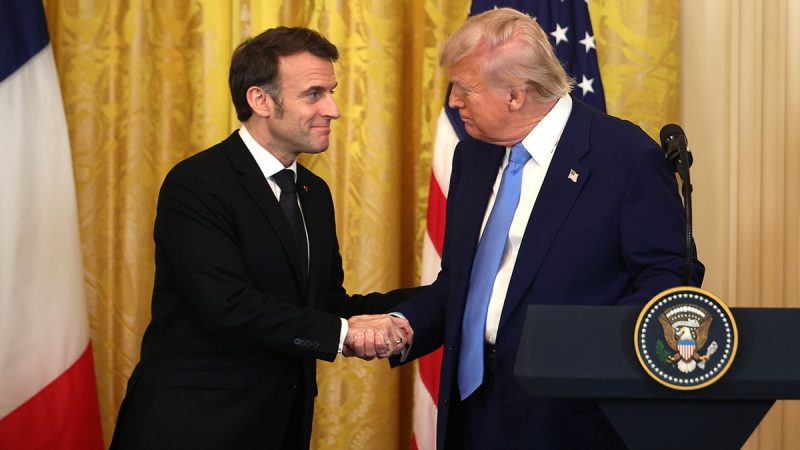From Gaza to Greenland, Macron breaks with Trump on global flashpoints

From Gaza to Greenland, French President Emmanuel Macron appears to be taking increasingly bolder diplomatic stabs at President Donald Trump’s foreign policy even though such gestures don’t ‘carry weight’ as Trump pointed out last week after the French leader declared his intention to recognize a Palestinian state.
‘French Presidents from Charles de Gaulle onwards have reveled in the idea that they are a natural counterweight to U.S. foreign policy on the international stage,’ Alan Mendoza, executive director of the U.K.-based Henry Jackson Society, told Fox News Digital Monday.
Charles de Gaulle was France’s long-serving leader in the 1950s and 1960s and was famously resistant to U.S. global dominance, withdrawing his country from NATO’s military command structure in a bid to increase its military independence and criticizing U.S. policies in Eastern Europe and Vietnam.
Such contrarian actions, Mendoza said, ‘have in many ways defined the French Fifth Republic, with larger-than-life characters thrusting their views onto the world stage.
‘The difference now is that France matters far less globally than it did 60 years ago,’ he said, adding that a weakening of the European country’s economy and its military might ‘means that where once de Gaulle could roar, now Macron whimpers.’
‘What was once a sign of French strength and confidence now therefore looks more like a desperate attempt to escape irrelevance,’ said Mendoza.
In a dramatic announcement last week, Macron said that at the United Nations General Assembly in September France intends to declare its recognition of a Palestinian state, even as Palestinian terror groups continue to battle Israel in the Gaza Strip.
The statement drew condemnation from Israeli Prime Minister Benjamin Netanyahu, who said such a move ‘rewards terror.’
It was also criticized by Secretary of State Marco Rubio, who called the decision ‘reckless’ and ‘a slap in the face to the victims of October 7th.’ He said the U.S. strongly rejected such a plan.
Trump merely dismissed Macron’s Gaza move, telling reporters at the White House Friday ‘what he says doesn’t matter.’
‘He’s a very good guy. I like him, but that statement doesn’t carry weight,’ the president said.
This is not the first time the president has discounted Macron as inconsequential.
Last month, after the French president speculated about Trump’s reasons for leaving the G7 summit in Canada early and returning to Washington, the president wrote on his Truth Social platform, ‘Wrong! He has no idea why I am now on my way to Washington, but it certainly has nothing to do with a Cease Fire. Much bigger than that. Whether purposely or not, Emmanuel always gets it wrong. Stay Tuned!’
In the same post, Trump said Macron was ‘publicity seeking.’
The disparaging comments came after Macron directly contradicted Trump’s foreign policy by stopping on his way to the summit in the semi-autonomous Arctic territory of Greenland, which Trump has said he wishes to acquire.
‘Greenland is not to be sold, not to be taken,’ Macron declared in a diplomatic stab at Trump’s foreign policy and seemingly an attempt to rally support from other European countries to stand up to the U.S.
Asked about Trump’s ambitions for Greenland, Macron, according to Reuters, said, ‘I don’t think that’s what allies do. … It’s important that Denmark and the Europeans commit themselves to this territory, which has very high strategic stakes and whose territorial integrity must be respected.’
In February, the French president paid his first visit to the White House since Trump’s return to power, and while the meeting appeared to be warm, it also came amid tension over the U.S. approach to the Russia-Ukraine war.
Hours before the meeting, the U.S. voted against a United Nations resolution drafted by Ukraine and the European Union condemning Russia for its invasion.
Tensions between Macron and Trump are not personal, said Mendoza, but they are also not totally ideological.
They stem from Macron’s ‘desire to be relevant and to stand for something,’ he said. ‘The French are famous contrarians, but they do it for the sake of being contrarian.’
Reuel Marc Gerecht, a resident scholar at the Foundation for Defense of Democracies, the Washington, D.C., think tank, said Macron was no ‘different from most European leaders. … Trump just isn’t their cup of tea.’
‘Most view Trump as a convulsive, hostile force who views America’s historic relationship with Europe as transactional,’ he said.
‘Macron, like most French leaders, defines himself in part against the U.S.,’ Gerecht added, explaining that, traditionally, France and America ‘had a ‘mission civilisatrice’ or a competitive enlightenment mission.’
‘The American way has been enormously appealing in Europe since World War II, but it has come in part at the expense of the French, who have culturally lost a lot of ground to the Anglophones, especially the Americans,’ he said. ‘Consequently, many Frenchmen have a love-hate relationship with the U.S.’
On Macron, Gerecht added, ‘He is part of the French elite. They are a bright lot who punch way above their weight, but, educationally, temperamentally, they are nearly the opposite of Trump.’







